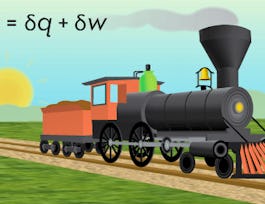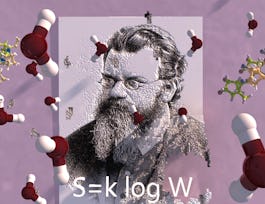Course 3 of Statistical Thermodynamics, Ideal Gases, explores the behavior of systems when intermolecular forces are not important. This done by evaluating the appropriate partition functions for translational, rotational, vibrational and/or electronic motion. We start with pure ideal gases including monatomic, diatomic and polyatomic species. We then discuss both non-reacting and reacting ideal gas mixtures as both have many industrial applications. Computational methods for calculating equilibrium properties are introduced. We also discuss practical sources of ideal gas properties. Interestingly, in addition to normal low density gases, photons and electrons in metals can be described as though they are ideal gases and so we discuss them.



Ideal Gases
This course is part of Statistical Thermodynamics Specialization

Instructor: John W. Daily
Sponsored by Mojatu Foundation
6,491 already enrolled
(141 reviews)
What you'll learn
Analyze the behavior of monatomic, diatomic, and polyatomic ideal gases under various conditions
Describe the distinction between pure ideal gases and ideal gas mixtures and their industrial applications
Identify the key components of the partition functions used to describe translational, rotational, vibrational, and electronic motion
Details to know

Add to your LinkedIn profile
5 assignments
See how employees at top companies are mastering in-demand skills

Build your subject-matter expertise
- Learn new concepts from industry experts
- Gain a foundational understanding of a subject or tool
- Develop job-relevant skills with hands-on projects
- Earn a shareable career certificate


Earn a career certificate
Add this credential to your LinkedIn profile, resume, or CV
Share it on social media and in your performance review

There are 3 modules in this course
Module 1 starts an exploration of systems for which intermolecular forces are not important. This is done by evaluating the appropriate partition functions for translational, rotational, vibrational and/or electronic motion. In this module we explore pure ideal gases including monatomic, diatomic and polyatomic species. We also explore literature sources of properties and empirical estimation methods.
What's included
5 videos5 readings4 assignments3 discussion prompts
In Module 2 we discuss both non-reacting and reacting ideal gas mixtures as both have many industrial applications. Computational methods for calculating equilibrium properties are introduced.
What's included
3 videos3 readings3 discussion prompts
Interestingly, in addition to normal low density gases, photons and electrons in metals can be described as though they are ideal gases and so we discuss them.
What's included
2 videos2 readings1 assignment1 discussion prompt
Instructor

Offered by
Why people choose Coursera for their career




Learner reviews
141 reviews
- 5 stars
68.08%
- 4 stars
24.11%
- 3 stars
3.54%
- 2 stars
0.70%
- 1 star
3.54%
Showing 3 of 141
Reviewed on Apr 10, 2021
Great course to learn about Ideal Gases and I highly recommend this course.
Reviewed on Jun 22, 2020
This is definitely the best course that I've had on ideal gases. It is such an eye opener.
Reviewed on May 15, 2021
It is very interesting but the week one was a difficult one for me.
Recommended if you're interested in Physical Science and Engineering

University of Colorado Boulder

University of Minnesota

Carnegie Mellon University

University of Colorado Boulder

Open new doors with Coursera Plus
Unlimited access to 10,000+ world-class courses, hands-on projects, and job-ready certificate programs - all included in your subscription
Advance your career with an online degree
Earn a degree from world-class universities - 100% online
Join over 3,400 global companies that choose Coursera for Business
Upskill your employees to excel in the digital economy


